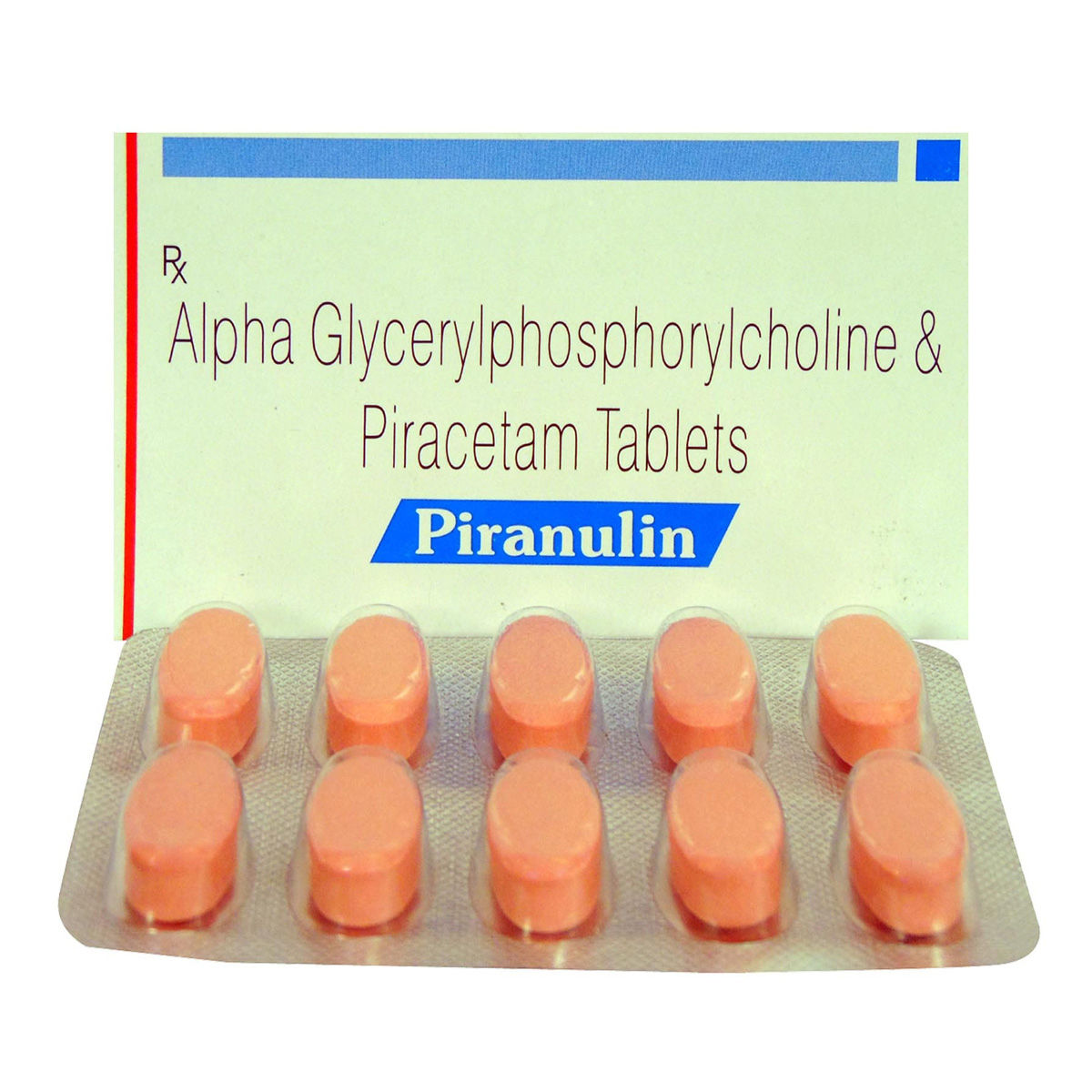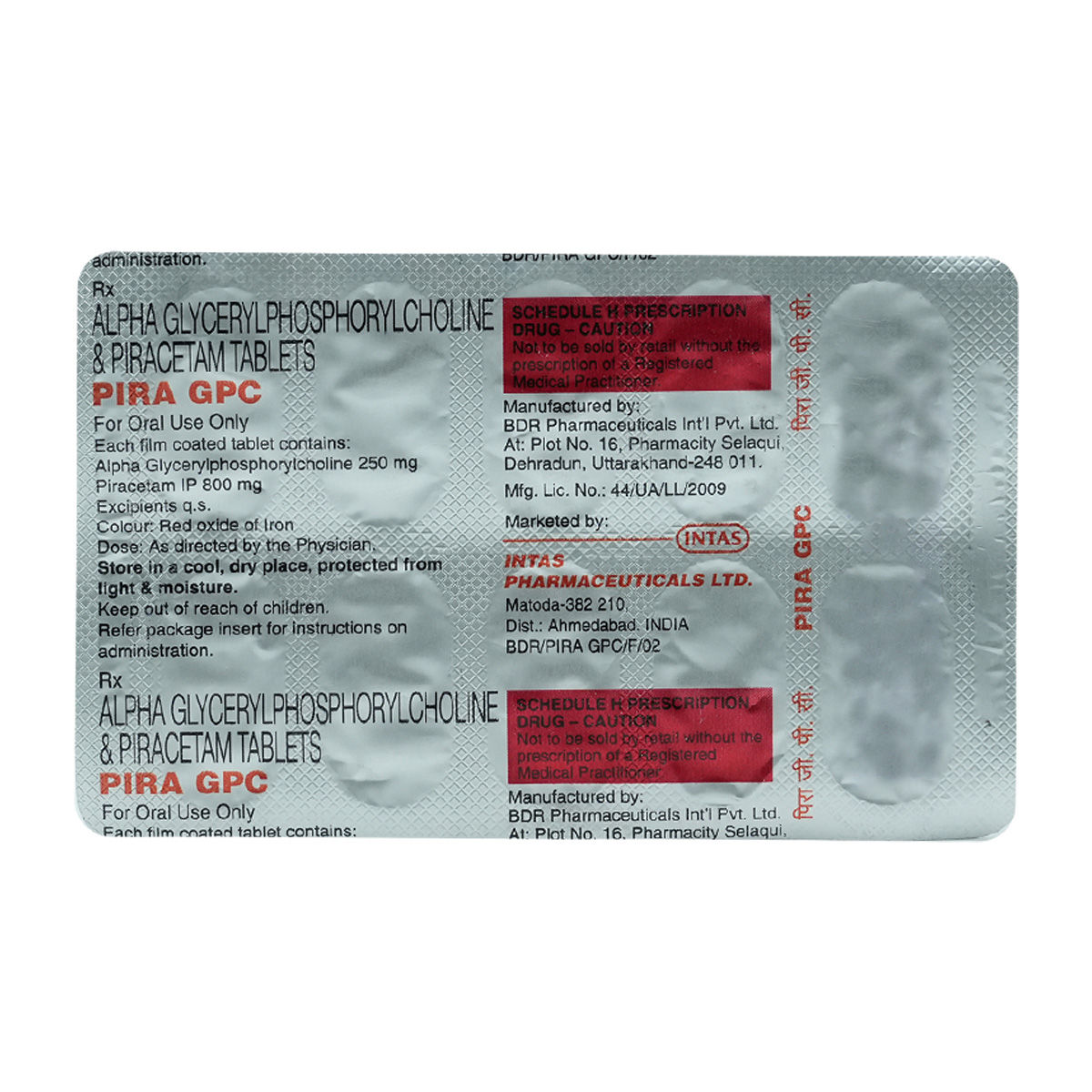Alpha Glycerylphosphorylcholine
About Alpha Glycerylphosphorylcholine
Alpha Glycerylphosphorylcholine belongs to the class of 'cognitive-promoting agents,' primarily used to improve cognitive/mental function. Alpha Glycerylphosphorylcholine is used to enhance brain function in dementia (memory loss), stroke, and Alzheimer's disease. Alzheimer's disease is a neurological disorder that causes dementia (memory loss) and slowly destroys the ability to think, learn, communicate, and handle daily activities.
Alpha Glycerylphosphorylcholine contains Alpha-glycerylphosphorylcholine, a choline-containing supplement. It enhances the activity of a chemical messenger/neurotransmitter called acetylcholine and improves mental and cognitive functions, such as learning, understanding, and thinking. It also nourishes the nervous system and acts as a neuroprotective agent, thus useful in patients who have suffered from a stroke.
Take Alpha Glycerylphosphorylcholine as prescribed by your doctor. Common side effects of Alpha Glycerylphosphorylcholine include stomach upset, headache, dizziness, nausea, vomiting, heartburn, skin rash, nervousness, and diarrhoea. These side effects are not familiar to everyone and vary individually. If you notice any side effects that are not manageable, please consult your doctor.
Please tell your doctor if you are allergic to Alpha Glycerylphosphorylcholine or its components. Inform your doctor beforehand if you have a history of liver, kidney, or heart disease. If you are pregnant, planning to conceive, or a breastfeeding mother, inform your doctor before starting Alpha Glycerylphosphorylcholine. This medicine may cause dizziness; hence, drive only when you are alert. Avoid consuming alcohol along with Alpha Glycerylphosphorylcholine as it can make you dizzy.
Uses of Alpha Glycerylphosphorylcholine
• Enhances Cognitive Function: Alpha Glycerylphosphorylcholine helps improve memory, learning, and thinking by increasing levels of acetylcholine, a neurotransmitter crucial for brain function. • Manages Dementia in Alzheimer’s disease: Alpha Glycerylphosphorylcholine is used to treat the symptoms of dementia (memory loss) in individuals with mild to moderately severe Alzheimer’s disease. • Aids in Stroke Recovery: Alpha Glycerylphosphorylcholine is used in some cases to support the recovery process after a stroke or brain injury by promoting the repair and regeneration of brain and nerve cells.
Medicinal Benefits
Alpha Glycerylphosphorylcholine contains 'Alpha Glycerylphosphorylcholine.' It improves the activity of acetylcholine (a brain chemical) levels in the central nervous system and thus improves mental and cognitive functions, such as memory and thinking. Alpha Glycerylphosphorylcholine helps in the overall improvement of brain function and mental focus. Alpha Glycerylphosphorylcholine is also used to enhance athletic performance when used as a supplement.
Directions for Use
- Alpha Glycerylphosphorylcholine should be taken with food to avoid stomach upset.
- It is recommended to take Alpha Glycerylphosphorylcholine twice daily or as advised by your doctor.
- Swallow Alpha Glycerylphosphorylcholine as a whole with a glass of water.
- Do not crush, chew, or break it.
Storage
Side Effects of Alpha Glycerylphosphorylcholine
- Stomach upset
- Headache
- Dizziness
- Nausea
- Vomiting
- Heartburn
- Nervousness
- Skin rash
- Diarrhoea
Drug Warnings
Brief your medical history if you have any liver or kidney diseases, heart problems, and allergic reactions before starting Alpha Glycerylphosphorylcholine. If you are a pregnant or breastfeeding mother, please consult your doctor before taking Alpha Glycerylphosphorylcholine. Avoid consuming alcohol along with Alpha Glycerylphosphorylcholine as it might lead to increased dizziness. Do not drive or operate machinery since Alpha Glycerylphosphorylcholine may decrease your mental alertness, making you feel dizzy. This medicine should not be given to children.
Drug Interactions
Drug-Drug Interaction: Alpha Glycerylphosphorylcholine may interact with motion sickness medicines (scopolamine).
Drug-Food Interaction: Do not consume alcohol while taking this medicine as it could lead to increased dizziness.
Drug-Disease Interaction: Let your doctor know if you have any liver or kidney diseases, heart problems, and allergic reactions before starting Alpha Glycerylphosphorylcholine.
Drug-Drug Interactions Checker List:
Safety Advice

Alcohol
unsafeIt is advised to limit alcohol consumption while taking Alpha Glycerylphosphorylcholine. Alcohol intake, along with Alpha Glycerylphosphorylcholine, may cause increased dizziness. Please consult your doctor for more information.

Pregnancy
consult your doctorIt is not recommended for use in pregnancy. Inform your doctor if you are pregnant before taking this medicine.

Breast Feeding
consult your doctorLimited information is available on this. Please consult your doctor before taking Alpha Glycerylphosphorylcholine if you are a breastfeeding mother.

Driving
unsafeAlpha Glycerylphosphorylcholine may make you feel dizzy. Do not drive if you are not mentally alert or experience any symptoms that affect your ability to drive or operate machinery.

Liver
consult your doctorPlease consult your doctor before using Alpha Glycerylphosphorylcholine if you suffer from severe liver impairment/liver disease.

Kidney
consult your doctorPlease consult your doctor before using Alpha Glycerylphosphorylcholine if you suffer from any severe kidney impairment/kidney disease.

Children
consult your doctorUse is not recommended for children. Please consult your doctor for more information.
Habit Forming
Diet & Lifestyle Advise
- Maintain proper weight by following a healthy diet.
- Exercise regularly as it helps in less cognitive decline and brain volume loss.
- Avoid smoking and alcohol consumption.
- Try to avoid stress by practicing meditation or yoga.
- Include fruits and vegetables in your diet as they contain antioxidants.
- Eat nutritious food as it helps in cognitive stimulation.
- Limit foods with high cholesterol and saturated fats.
- Cut down on sugar, salt and processed foods.
- Create a bedtime routine as it helps in relaxation and stress reduction.
- Follow a healthy lifestyle as it helps in improving overall health and possibly protects the brain.
Special Advise
Let your doctor know that you are taking Alpha Glycerylphosphorylcholine if you are undergoing any medical tests.
Patients Concern
Disease/Condition Glossary
Alzheimer's disease: It is a neurological disorder that causes dementia (memory loss) and slowly destroys the ability to think, learn, communicate, and eventually, the ability to handle daily activities. It is the most common cause of dementia (memory loss) in adults. Symptoms of Alzheimer's disease include memory loss, trouble with familiar tasks, difficulties with problem-solving, trouble with writing or talking, disorientation, problems with reasoning or judgment, mood and personality changes. Dementia is the loss of cognitive functioning, such as remembering, thinking, and reasoning.
FAQs
Alpha Glycerylphosphorylcholine belongs to the class of 'cognitive-promoting agents,' primarily used to improve cognitive/mental function. Alpha Glycerylphosphorylcholine is used to enhance brain function in dementia (memory loss), stroke, and Alzheimer's disease.
Alpha Glycerylphosphorylcholine contains Alpha Glycerylphosphorylcholine, a nootropic supplement that increases acetylcholine activity in the central nervous system and enhances the neurotransmission process. Thus, Alpha Glycerylphosphorylcholine improves memory, thinking, and awareness.
Alpha Glycerylphosphorylcholine should be used with caution in the medical history of liver or kidney diseases, heart problems, and allergic reactions. Please let your doctor know if you have any other medical concerns before starting Alpha Glycerylphosphorylcholine.
It is advised to take Alpha Glycerylphosphorylcholine with food to avoid any stomach upset. Please consult your doctor for more information.
Take the missed dose as soon as possible. However, if it is time for the next dose, skip the missed dose and go back to your regular dosing schedule. Do not double the dose.
Alpha Glycerylphosphorylcholine starts working in 6 days but it may take a few months or longer to show its complete effects based on your medical condition.
There is no evidence to suggest that Alpha Glycerylphosphorylcholine leads to depression. Research shows that it may have a positive effect on mood and cognitive function due to its role in increasing acetylcholine levels in the brain.
Foods that contain Alpha glycerylphosphorylcholine or alpha GPC are chicken, turkey,fish, eggs, soybeans and soy-derived products like tofu, dairy products, quinoa and almonds.
The side effects of Alpha Glycerylphosphorylcholine include headache, dizziness, stomach upset, diarrhoea, vomiting, heartburn, nausea, skin rash, and nervousness. Consult the doctor if any of these side effects persist or worsen.








